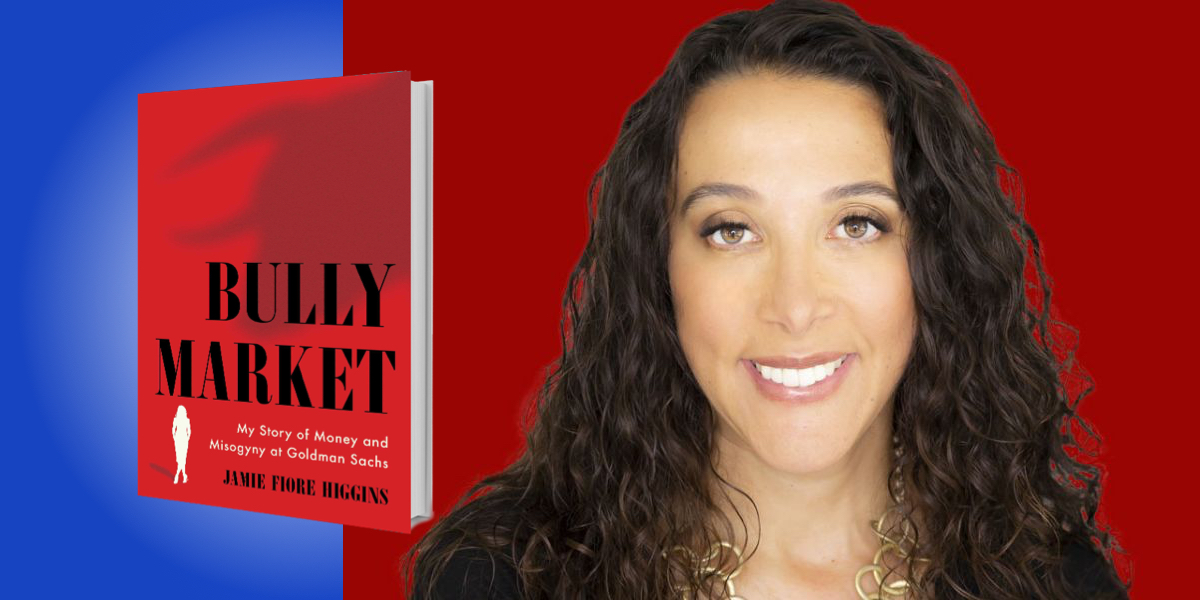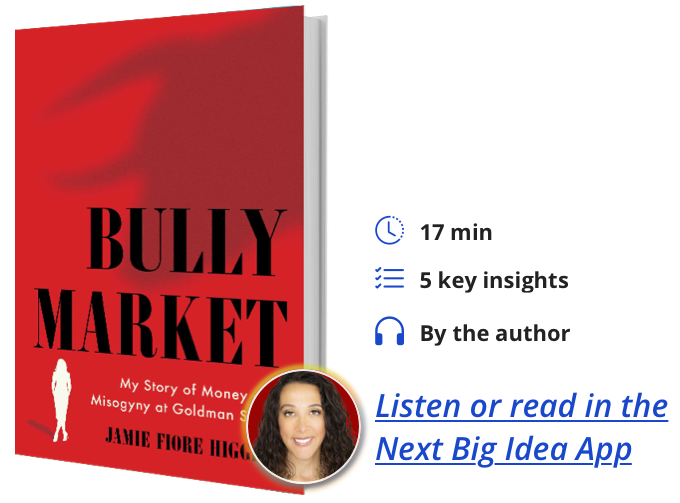Jamie Fiore Higgins is a life coach and former managing director at Goldman Sachs.
Below, Jamie shares 5 key insights from her new book, Bully Market: My Story of Money and Misogyny at Goldman Sachs. Listen to the audio version—read by Jamie herself—in the Next Big Idea App.
1. Don’t lose yourself in your career.
My job at Goldman Sachs started when I was a 21-year-old college student. Growing up, however, I wanted to be a social worker. My childhood was filled with health issues stemming from my severe scoliosis, so I benefited from the support of counselors and social workers. For my own career, I wanted a similar path, one that gave back to others.
As first-generation immigrants, my parents pulled themselves out of poverty and instilled in their children that “every generation must do better.” That meant finding the best-paying job possible, and in 1998, that job was on Wall Street.
I was raised in suburban New Jersey with ironclad values: the importance of family, hard work, determination, honesty, and integrity. I entered Goldman Sachs without connections or market knowledge, with the goal of making my family proud through financial security.
When I arrived at work, it was a culture shock. Many of my colleagues came from a world of money and connections. While they lived in parent-funded apartments in Soho, I commuted two hours every day from New Jersey so I could save money. I was determined to persevere, and huge paydays came quickly. During my first year at Goldman Sachs, I earned more than my parents ever had at the height of their careers. I felt both pride and shame in that.
My work performance was quickly recognized. I was suddenly referred to as “Jamie from Goldman,” as if I worked for the family business and Goldman was my surname. Jamie from Goldman was sharp, savvy, and respected. I fell in love with being her. Jamie from Goldman was a far cry from the New Jersey dork who wore a back brace for scoliosis.
The years flew by, and my paychecks filled me with the pride that my work did not. I elevated my whole family financially. My success was built on my head for numbers and my work ethic, but it also relied on my ability to look the other way.
“While my bank account ballooned, my morals were shrinking.”
Promotions and pay increases were dangled in front of me as payment for my silence. In fact, when I personally was assaulted by a co-worker, I was promptly advised not to report it. I lied to lawyers and insisted that Goldman Sachs was a good place for women to work. When I was propositioned, harassed, and ridiculed, I said nothing. When I witnessed others’ mistreatment, I minimized or ignored it.
While my bank account ballooned, my morals were shrinking. I didn’t recognize myself anymore. I’d traded all the morals my family gave me for the power, money, and prestige of Goldman Sachs.
2. Coping mechanisms can mask big problems.
As time passed, I saw the destruction that my work environment was causing and started to rely on coping mechanisms. I took my first Xanax immediately after September 11th when I was terrified to return to my lower Manhattan office. This started a long-term love affair with the drug. At first, I used Xanax like a “rescue inhaler” for when the stakes got high at work.
Soon, however, it went from a once-in-a-while to a necessity to get through the day. I didn’t stop to think about why I was so anxious. All I wanted was to take away the discomfort. Whether it was Xanax by day or alcohol at night, I found myself using those drugs to anesthetize myself from anxiety, loneliness, and depression.
It wasn’t only drugs. Once I was married and had children, I felt even more pressure. I was providing for two families: my family of origin and the family I built. Work was non-stop and I never had time to breathe, rest, or think. My relationship with my husband was strained. Then a close male colleague entered the picture. He was 20 years older, divorced, and an empty-nester. He was my source of career support, relief, validation, and appreciation that I wasn’t getting at home. Innocuous drinks after work and being able to talk about work pressures were comforting, but eventually, they led to something more.
Before I knew it, I was having an affair. My behavior spiraled downward from that person who was so devoted to family, with three adorable children at home. That’s when it started to hit me. My coping mechanisms were not healthy. They were escapes: from office politics, from the pressure of being a provider, mother, worker, and wife. All of this, while I simultaneously felt like I was failing at everything. That’s when I realized what I needed to escape was Goldman Sachs.
3. See the light and trust your gut.
Once I swapped the toxic Goldman Sachs lenses for crystal clear ones, I made drastic changes. For years, the name of the company had made me believe that I was nothing without them. There was a time when I convinced myself I could never be successful anywhere else. I was the perfect person to fall for their warped world: a person without industry connections, living under pressure to provide for my family.
“No matter where we work, or who signs our paycheck, we are all CEOs of our own careers.”
After all those years, I woke up to the truth that I had been successful because of my personal talents, not because of Goldman Sachs. Only then was I able to walk away and pursue a career that was more fulfilling. Now, as a life coach, I help professionals see their own lights. No matter where we work, or who signs our paycheck, we are all CEOs of our own careers.
Think about careers as a pie, with three major pieces: compensation, passion, and flexibility. What does your ideal pie look like? Do you want all the pieces the same size? Will you sacrifice a little passion for money? Or is flexibility most important? Are you being compensated fairly? Are you passionate about the change you are making in the world? Do you feel aligned with the firm’s values? Are you getting the flexibility to pursue goals outside the office? If any of these pieces fall short, make a list of things that need to change. Strategize and make a plan.
4. Organizations need to bring diverse workers in and create environments that make them want to stay.
Companies have got to start bridging the divide between their executive offices and their day-to-day management. Many large firms like Goldman Sachs say all the right things about diversity and inclusion in their business principles, press releases, and employee handbooks. The problem is, their actions don’t match their words.
Firms should hire “culture officers” to police their floors with the same fervor as compliance officers police for insider trading and unethical business practices. When bad actors emerge and the goals of the firm aren’t modeled, enforce a no-tolerance policy, even if these people are considered innovative thought leaders or large revenue producers. There is an abundance of smart people in this world. Successful companies don’t have to choose between solid character and sharp intelligence; our workforce can have both.
Human Resources departments should be truly independent or taken out-of-house so they can truly support and protect their employees. In the past when I found the courage to report bad behavior, my Human Resources department didn’t protect me. HR departments cannot possibly protect employees while simultaneously being influenced by the power of the firm’s senior leaders.
Companies must also invest in and support Women, BIPOC, and LGBTQ+ at every level of the organization. Many firms share impressive goals for hiring women and marginalized communities. While some of those goals are reached at the new hire level, representation slides from there. For example, 50 percent of new hires at Goldman Sachs are women, but at the highest-ranking partner level, they make up less than 20 percent.
It’s not just about bringing diverse workers in, it’s also about creating an environment where they want to stay. These workers shouldn’t have to fend for themselves and they should be supported at every step of their careers.
Real progress will be made when companies expand diversity hiring goals at every level, from the juniors right up to the executive office. Firms like Goldman Sachs use metrics and set goals all the time for things like market share and revenue. They should set similar goals for diversity at the senior level and track diverse employee careers with the same fervor.
“Successful companies don’t have to choose between solid character and sharp intelligence; our workforce can have both.”
As firms make strides in diversity, they must also make diversity of thought a priority. The only reason I was successful as a woman at Goldman Sachs was because I towed the party line. I followed the playbook created by male management and mimicked the men in the glass offices in order to achieve success. To achieve greater diversity in our organizations, we have to be open and accepting of diverse opinions and perspectives. Otherwise, we do not allow for unique voices and sentiments to be heard.
5. Ride the wave of social justice by telling your stories.
Thanks to the #metoo movement and other social justice movements, we’ve seen important workplace changes happen in the past few years. We need to keep up that momentum. If it hadn’t been for the #metoo movement, I wouldn’t have had the courage to tell my story. My hope is that my story gives strength to others. I am one of the few talking about my experience in the corporate world, but I know I’m not the only one with something to say. Let’s continue telling our stories and speaking our truths.
For adults entering the workforce, my advice is to read the fine print. A new career is a big decision, so do your research. Don’t let a smoke-and-mirrors marketing pitch with impressive fringe benefits gloss over the day-to-day experience. If you have been working at a company for a while, check in to see if what you are experiencing is what you were promised. Then treat it like any other transaction: speak up and demand that they clear up any discrepancy.
For anyone currently in a difficult work environment, your unique voice is worthy and should not be silenced. Rip off your muzzle and change the firm for the better. The worst thing I did to my colleagues was not speaking up and protecting them when I saw injustice in the workplace. I hurt them with my silence and I regret it to this day.
Demand recognition for your ideas and your content. I know it is easier said than done, but if you feel like you are being treated unfairly, you deserve to push back. If your voice isn’t heard, don’t be afraid to walk away. No amount of money is worth sacrificing who you are and you know the value of your work best.
It’s a big world, with loads of opportunities. Many firms allow employees to follow their passion, be well-compensated, and have a fulfilling professional career. A valuable employee is one who can face themself in the mirror. You don’t have to sacrifice who you are for what you do.
To listen to the audio version read by author Jamie Fiore Higgins, download the Next Big Idea App today:

































